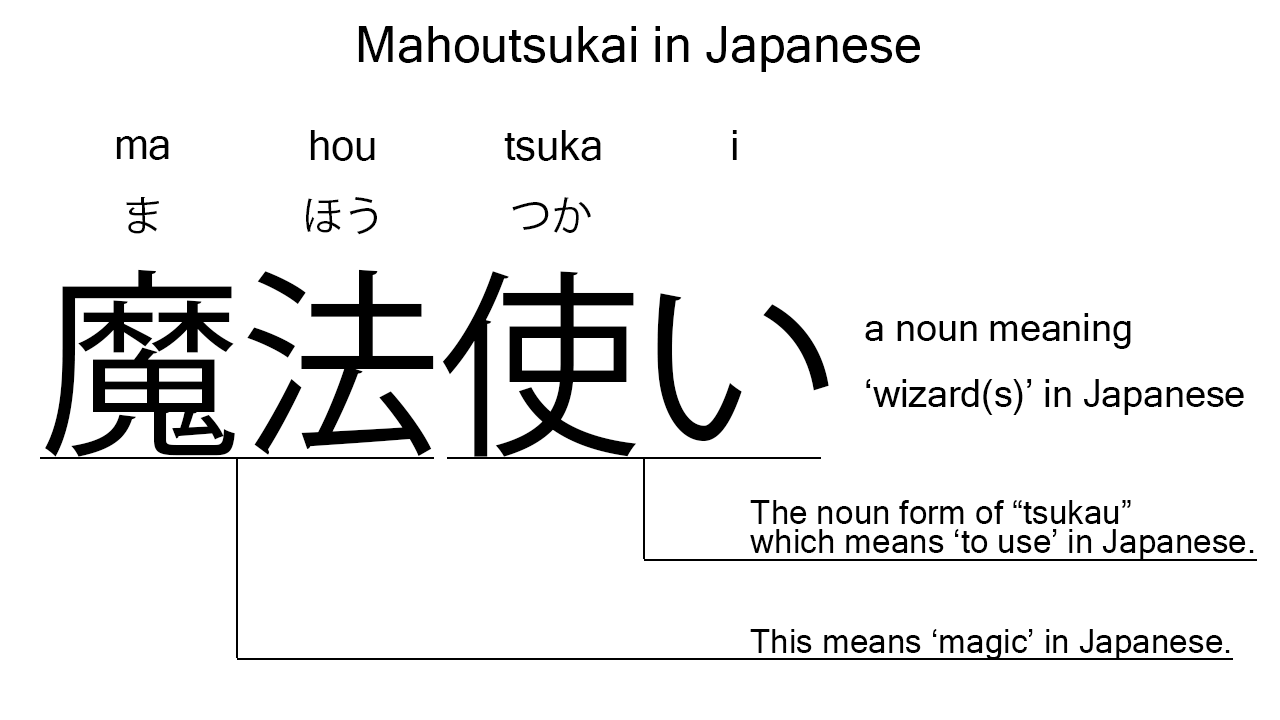What does “mahoutsukai” mean in Japanese?
Native speakers say “mahoutsukai” normally to mean ‘wizard’ in Japanese. Perhaps, some Japanese learners know this word as it is sometimes used in Japanese movies, video games, songs, novels, manga, anime, and the like. In this blog post, however, I will explain this word in detail based on its grammatical components. And also, I will explain how to use it through example sentences. My explanations would help Japanese learners understand “mahoutsukai” more clearly. Then, let’s get started!
Contents
Definition and meanings of “mahoutsukai”
Let me start with the definition and meanings of “mahoutsukai”.
- mahoutsukai – 魔法使い (まほうつかい) : a noun meaning ‘wizard’ in Japanese. This can also work as plural. Learn more about Japanese plural. Depending on the context and situation, this can also mean ‘witch’ in Japanese.
Native speakers use this noun to refer to a person or people who can cast magic spells. Sometimes this is translated into English as “witch”, but Japanese has the specific word for female wizards: majo.
The definition and meanings are not that difficult. To understand this noun more clearly, however, let me explain its components in detail, one by one.
What does “mahoutsukai” literally mean?
“Mahoutsukai” consists of the following two components:
- mahou – 魔法 (まほう) : a noun meaning ‘magic’ in Japanese.
- tsukai – 使い (つかい) : the noun form of the verb, “tsukau“, which means ‘to use’ in Japanese.
These two components tell us that the formed noun literally means a ‘magic user’ in Japanese. This literal interpretation is not completely in line with the actual meanings, but still understandable, I think. Wizards are often magic power users.

When we meet new Japanese words, we should check their grammatical components in detail to understand their meanings clearly and deeply. In many cases, components tell us a lot about the meanings of the words they form. Actually, here, we could get the better understanding of “mahoutsukai” through the detailed check above.
So far, I’ve explained the definition and meanings of “mahoutsukai” together with its components. Then, let me explain how to use it through the example sentences below.
Example #1: how to say “wizard” in Japanese
boku wa mahoutsukai ni nari tai – 僕は魔法使いになりたい (ぼくはまほうつかいになりたい)
I want to become a wizard.
Below are the new words used in the example sentence.
- boku – 僕 (ぼく) : a pronoun meaning ‘I’ in Japanese. This is used mainly by boys and young males.
- wa – は : a binding particle working as a case marker or topic marker. In the example, this works after “boku” to make the subject in the sentence.
- ni – に : a case particle used to say what someone or something becomes after a change or action. In the example, this is used after “mahoutsukai” to say what the speaker wants to become.
- nari – なり : one conjugation of the verb, “naru”, which means ‘to become’ in Japanese. In the example, it has been conjugated for the better connection with its following word.
- tai – たい : an auxiliary verb used after a verb to make its desire form. In the example, this is used after “nari” to make its desire form, “nari tai”, which means ‘to want to become’ in Japanese.
This is a typical usage of “mahoutsukai”. In this example, it works together with the case particle, “ni”, to become the object in the sentence.
Example #2: another usage of “mahoutsukai”
boku no ojisan wa sugoi mahoutsukai desu – 僕の伯父さんは凄い魔法使いです (ぼくのおじさんはすごいまほうつかいです)
My uncle is a great wizard.
Below are the new words used in the example sentence.
- no – の : a case particle used after a noun or pronoun to make its possessive case. In the example, this is used after “boku” to make its possessive case, “boku no”, which means ‘my’ in Japanese.
- ojisan – 伯父さん (おじさん) : a noun meaning ‘uncle’ in Japanese. This can also work as plural.
- sugoi – 凄い (すごい) : an i-adjective meaning ‘great’ or such in Japanese.
- desu – です : an auxiliary verb used after a noun or adjective to make it polite. Probably, this is well known as a part of Japanese desu form. In the example, this is used after “sugoi mahoutsukai” to make it sound polite.
This is another typical usage of “mahoutsukai”. In this example, it works together with the i-adjective, “sugoi”, to mean a ‘great wizard’ in Japanese. When we want to mean a ‘wizard’ in Japanese, anyway, this noun is always a very good option.
Summary
In this blog post, I’ve explained the definition and meanings of “mahoutsukai” in detail based on its grammatical components. And also, I’ve explained how to use it through the example sentences. Let me summarize them as follows.
- mahoutsukai – 魔法使い (まほうつかい) : a noun meaning ‘wizard’ in Japanese. This can also work as plural. Depending on the context and situation, this can also mean ‘witch’ in Japanese. This noun literally means a ‘magic user’ in Japanese. This literal interpretation is not completely in line with the actual meanings, but still understandable, I think. Wizards are often magic power users.
Hope my explanations are understandable and helpful for Japanese learners.